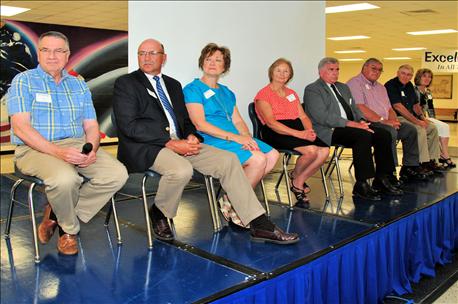
Over the past three decades, as I've met and reported on folks who have earned the title Master Farmer, I've been amazed at the things they have in common, and the continuity of advice they offer to young farmers.
A small group of farmers earn this recognition each year in the program started nearly 100 years ago by Prairie Farmer, one of our Penton Farm Progress publications.
They rarely know each other well – yet, when asked to share their values nearly all point to the same things: devotion to family, service to ag and community, and stewardship of livestock and land.

Indiana Master Farmers share wisdom at the 2015 Indiana Master Farmer awards ceremony held last month at Jay County High School.
This was the case a few weeks back when we honored Indiana Master Farmers Mike Flock, Terry and Susan Hayhurst, Mike and Jan Heckaman, Richard and Carol Kolhagen, and honorary master farmer Chris Hurt, extension ag economist extraordinaire from Purdue University.
When asked about the key to success, they each said family.
"We have a lot of family members who are actively involved or help us to make decisions," says Terry Hayhurst. His wife Susan didn't grow up on a farm, so transformation to country life has been an ongoing adventure.
"As a neophyte not knowing one thing about agriculture, it takes a lot of patience and it takes being willing to learn," she says. "If it's one thing I'm still doing every single day it's learning about where I live, why we do what we do and how important it is to share that with the consuming public."
"My dad let me make mistakes on my own," says Flock, who farms near Ramsey, Ind. "He let me do what I wanted to do. We grew acres as they became available. For the young people out there, you've got to give dad a break now and then. You may not agree with him but in the long run the majority of the time, he's right, or pretty close."
Argos, Ind., dairyman Mike Heckaman agrees that family has always been important, "but our employees have always been important as well," he adds. "Without all 13 jumping in, it would be difficult to run that dairy on a daily basis. It's all about the people."
Useful technology
Another common theme among the masters: technology without meaning is pretty useless.
"The most important thing is to be able to use the data that you have," says Hayhurst. "Otherwise, it's not worth much."
Finding the sweet spot in adopting technology has always been tricky for farmers. "You don't necessarily have to be on top of technology, but you sure don't want to be on the bottom," says Flock. "We have small, rolling fields, but autosteer works as good in southern Indiana as it does in Central Indiana. When you have a field that has eight sides, you start right down the middle and you can go either way."
In dairy, the latest technology appears to be coming in robotics and genetics, says Heckaman. "A guy in Europe told me 70% of milking there is done with robotics, and with the labor market the way it is, I can see that happening here, too," he says.
What advice do master farmers offer for young people today?
"Follow what you loved to do," says Purdue's Chris Hurt. "When we talk to incoming freshman about their interests, I usually say, what would you do on a Saturday and you had no obligations, and you could do whatever you want? Most young people light up and think about that free day. That's the mystery we want to grab on to."
In other words, pursue your passion and look for mentors to help along the way.
"When our girls were toddlers, they needed more than me," says Susan Hayhurst. "I could not be everything for them. They needed to find teachers they loved, who fed them with encouragement."
After meeting many Master Farmers over many years, it's easy to see why so many also make such great mentors for young farmers. They're worth getting to know and they are excellent ambassadors for agriculture.
About the Author(s)
You May Also Like






